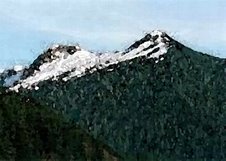One of our more popular series of photography books is the "A Day in the Life of..", in which a group of photographers across a country are invited to collect images on a particular day, and those images are then assembled into a lovely overview of how the country as a whole pursues their daily lives.
A century ago, a wealthy philanthropist pursued the same idea on an even grander scale. French banker Albert Kahn financed photographic expeditions to every corner of the globe, to record human civilization in color. Beginning in 1909, and continuing on for the next twenty years, these expeditions took portraits of families, scenery and workers on every inhabited continent except Australia. To put this into perspective, remember that the North Pole has just been discovered, the Montreal Canadiens have just been founded, and the U.S. Navy has just built a naval base at Pearl Harbor. Travel was difficult, communities were wary of foreigners, and color photography was still being experimented with.
The images in The Dawn of the Color Photograph: Albert Kahn's archives of the planet by David Okuefuna, are truly beautiful. Using the autochrome process, Kahn's photographers have recorded lush images of colorful ethnic dress and unspoiled wilderness. They have also recorded images of war, harsh criminal justice and poverty. Photos of buildings and machines that were considered the pinnacle of industry and technology then look quaint and historic now, while the portraits of the people are truly arresting. It's easy to see how much globalization has done away with cultural identity when you look at this book. People now all wear jeans, t-shirts and sneakers regardless of what continent you're on, while the villagers in these photos look like they've stepped out of a display of ethnic costumes. This is an interesting book to browse through, and the soft focus and static poses drain the images of harsh reality - even the children in cattle cars being sent to concentration camps prior to the Greco-Turkish War seem oddly detached from their fate.
Thursday, March 19, 2009
Subscribe to:
Post Comments (Atom)

No comments:
Post a Comment